The relationship between AI and eCommerce is strong and increasingly tightening as the digital sphere becomes more competitive. Both are evolving: AI is in the golden age of mass adoption, and eCommerce, after a huge pandemic boom, is stabilizing and undergoing market verification.
The balance of power is also shifting – a mobile-first approach is gaining strength, and desktop-oriented design is fading away as more and more purchases are made via smartphones. Just look at the mCommerce statistics – they hint that the coming years will be marked by mCommerce technology development.
Without AI in eCommerce, it is hard to imagine mobile apps in the form we have become accustomed to – personalized, automated, and optimized to make the shopping experience as reminiscent of in-store shopping as possible. How can we unlock the profits of AI eCommerce? Which eCommerce app features can AI enhance? Check out our tips and examples of successful implementations.
AI-Driven Personalization in AI based eCommerce
We all like to feel unique and noticed. In eCommerce, skillfully leveraging this weakness can be particularly profitable. With AI, this is relatively easy: just collect the right data and use it within various functions, from recommendations to push notifications. Some forms of personalization, like dynamic user interface customization, primarily aim to build long-term relationships. Most are designed to drive purchases – whether through personalized alerts, loyalty programs, or recommendations curated for their taste.
They can be even more effective with AI-based sentiment analysis. Many popular eCommerce stores, like Sephora, adjust product recommendations based on user feedback. When a customer expresses a positive opinion about a product, it will be recommended to others in the same segment.
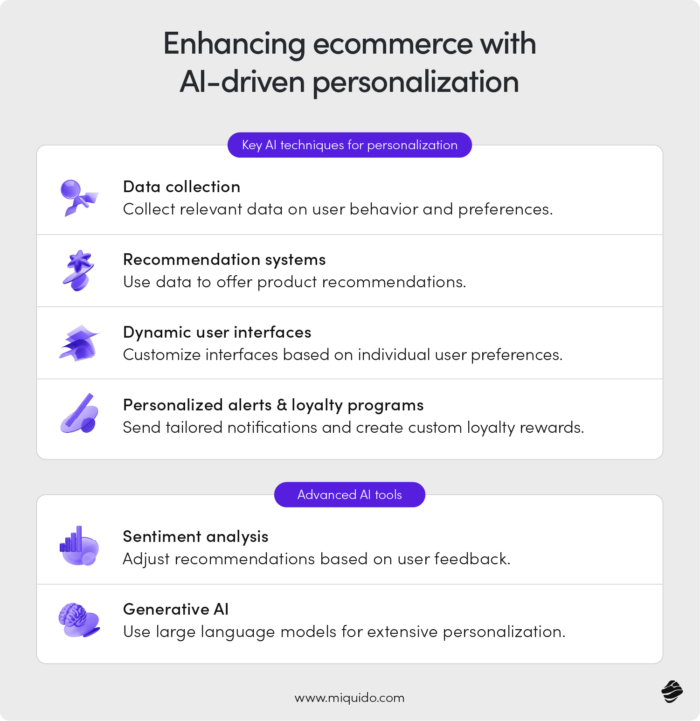
Now, with the possibilities of generative artificial intelligence, personalization is possible on a much larger scale than before. By leveraging large language models, which can often be seamlessly integrated into an mCommerce platform, shops can create a virtually unique “microcosm” for each user. With content, dynamic animations, recommendations, and sets of suggestions tailored to the moment, mood, and overall preferences of the shopper.
Dynamic Pricing
For many years, dynamic pricing was considered a controversial solution. Today, it is widely accepted, especially in the eCommerce sector, where services are offered and made possible by AI algorithms. When it comes to dynamic pricing, it’s hard not to think of Uber, which has made this strategy its hallmark. The app uses dynamic pricing to adjust fares based on demand, time of day, and user location.
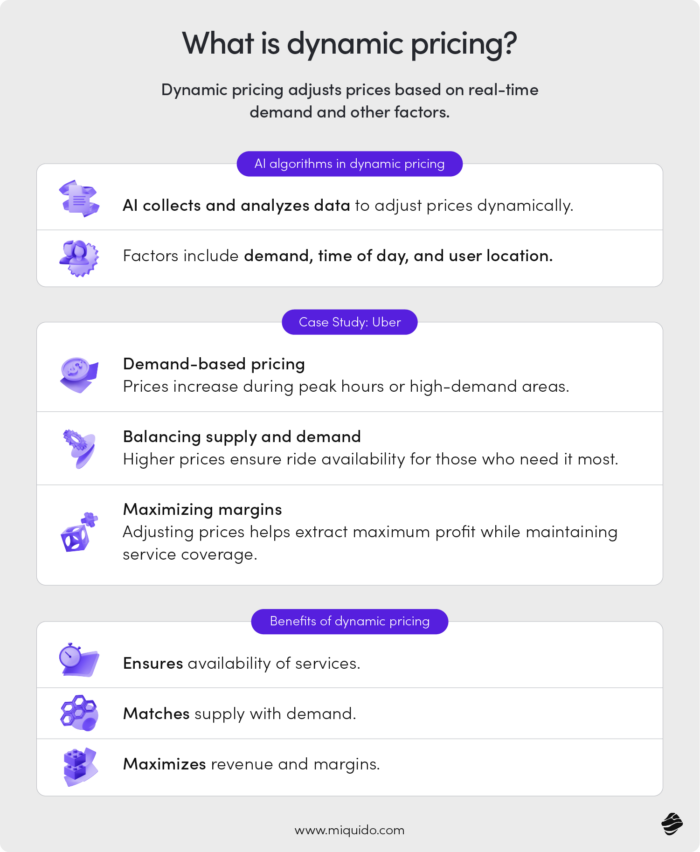
It’s not just about extracting the maximum margin but ensuring service coverage — during peak hours or in high-demand areas, Uber increases prices to balance supply and demand, ensuring availability of rides for users who need them most.
AI eCommerce Customized Content
This form of personalization is particularly effective in building long-term relationships with customers and brand loyalty. But it also drives sales! AI-driven content management systems can deliver personalized content, such as product descriptions, images, and promotional materials, based on user interests and browsing history. Etsy is a great example of mastering personalized content, providing users with customized product listings, homepage, and search results.
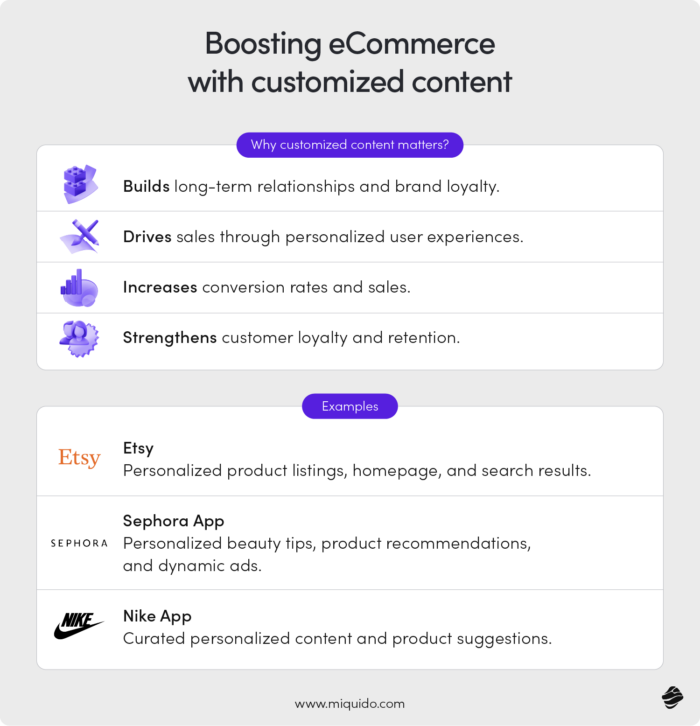
Now, in the era of open-source generative artificial intelligence, the entry threshold to the world of dynamic content has become much lower. Many shops take advantage of this – for instance, in Sephora’s mobile app, AI is used to generate personalized beauty tips, product recommendations, and dynamic ads that resonate with individual customers. Also, Nike’s app, for instance, uses it for curating personalized content and product suggestions.
Visual Search
You see an amazing pair of shoes in a magazine, on Instagram, or just on the street. You want to buy them very much but have no idea how to find them online. You try various descriptive search terms, but to no avail. The purchase opportunity is lost. Hard to believe, but not long ago, such situations were the norm. Today, thanks to the development of AI in eCommerce, they are virtually non-existent. AI-powered visual search is increasingly becoming an integral part of search functions in mCommerce apps.
An example is ASOS, whose visual search tool allows users to upload photos of clothing items to find similar products on their platform. A user can take a photo of a dress they like, and ASOS will show similar dresses available for purchase, making it easier to find desired items. This feature is a great way to capitalize on the purchase opportunity – especially now, as relatively few shops still use it. Etsy also has been using a similar feature since 2022.

Source
AI eCommerce Enhanced Security
Personalization also has another, less known side – it increasingly serves to enhance security. Through personalized authentication methods, such as biometric verification and behavior-based authentication, eCommerces can improve the security of their mobile apps and ensure their shopping experience is as safe as possible.
This method of ensuring security is not yet widespread in the eCommerce world, but it is very likely to become more common soon, moving beyond the financial niche (currently used by, among others, PayPal).
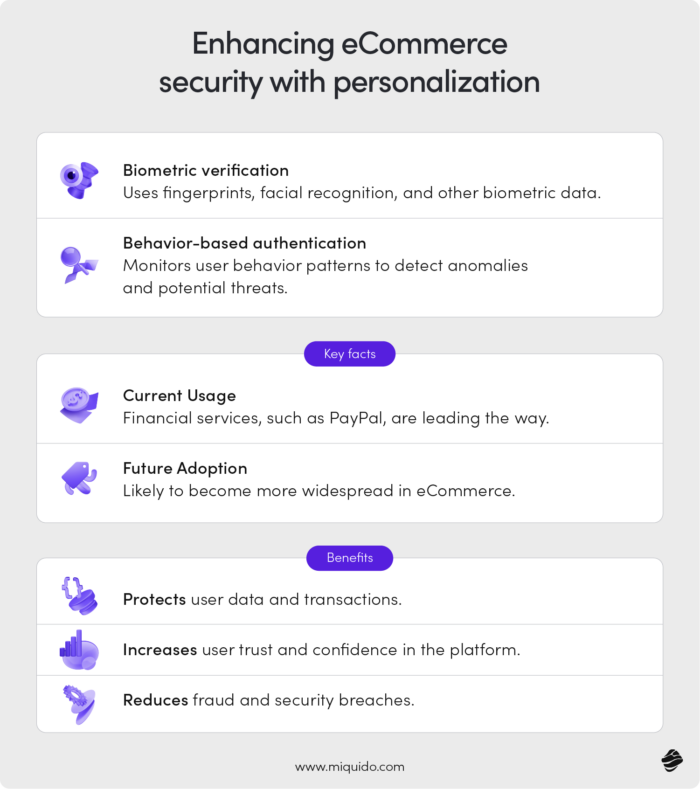
Augmented Reality (AR)
It’s time for the ultimate personalized experience, which is currently triumphant in many eCommerce niches. From virtual try-ons to home visualization tools, augmented reality features can enrich various shopping experiences and turn into an ultimate purchase impulse. Plus, it can reduce the number of returns, having an overall positive environmental impact. IKEA and ASOS are already using augmented reality AI features in eCommerce mobile apps, and we predict that many more shops will soon follow their tracks.
AI in eCommerce: Chatbots and Virtual Assistants
The boom associated with generative AI has changed our attitude towards chatbots in eCommerce. The capabilities they now guarantee are impressive — importantly, at a fraction of the cost that had to be reckoned with just a few years ago. The initial fascination users had with Chat GPT worked to the advantage of business adoption. Users learned how to effectively and consciously use this form of artificial intelligence and how to interact with it.
Today, AI-powered chatbots are becoming standard in customer service. They enable interactions in a much more natural, organic, and simply far less frustrating way for users. Instead of relying on pre-programmed scenarios, a generative virtual assistant finds the appropriate response, if necessary, using information retrieval from external sources.
Zalando, a pioneer of generative artificial intelligence in the fashion industry, supports its customer service in this way. In FMCG, Carrefour uses an AI assistant, whose Hopla offers real-time product suggestions and assists customers based on their preferences and shopping needs.
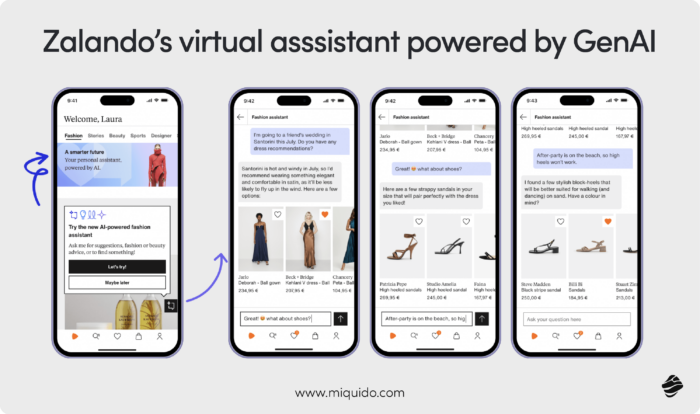
Source
Predictive Analytics and Customer Insights in AI based eCommerce
Leveraging AI for predictive analytics is transforming how eCommerce businesses understand customer behavior. AI eCommerce helps identify:
- Purchase Timing: Determining when customers are most likely to buy certain products.
- Shopping Patterns: Understanding preferred shopping days, product pairings, and browsing behavior.
- Impulse Triggers: Identifying what prompts impulse buys, such as promotions or limited-time offers.
- Trend Impact: Detecting how emerging trends influence purchasing decisions.
- Seasonal and Time Effects: Analyzing how seasons and times of day affect shopping habits.
- Customer Segments: Dividing customers into segments based on habits, preferences, and demographics for targeted marketing.
Enhancing Marketing Strategies and Product Development with AI Insights
AI-driven insights enhance marketing strategies and product development by:
- Identifying Viable Products: Highlighting which products are likely to succeed and be profitable.
- Maximizing Campaign ROI: Determining which products and channels yield the highest return on investment.
- Attracting High-Value Customers: Identifying marketing channels that draw the most valuable customer segments.
- Reducing Churn: Pinpointing stages in the purchase journey where customer drop-off is highest and addressing those areas.
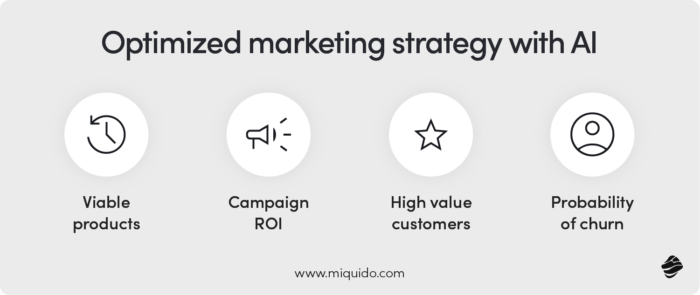
Automated Inventory Management for AI eCommerce
Inventory management is another aspect of modern eCommerce where AI became essential. By automating various aspects of inventory control, AI ensures that stock levels are accurately maintained and seamlessly integrated between physical stores and online shops.
This integration allows for real-time updates on product availability, ensuring that customers always have the most accurate information. Additionally, AI in eCommerce helps adjust marketing campaigns to address overstock issues, predicts sellouts by issuing alerts for restocking specific products, and automates returns management, making the entire process more efficient and less prone to errors.
Who leads the way in AI-driven inventory management? In the fashion segment, it’s hard not to mention Zara, which has become a benchmark for production and inventory management. In fashion, one must act quickly but with ultra-precision—Zara knows this well and understands that it wouldn’t be possible without advanced data and AI.
The brand forecasts demand for different styles and sizes with remarkable accuracy. This enables it to produce small batches of clothing and quickly restock items, minimizing unsold inventory and responding swiftly to changing customer preferences.

Fraud Detection and Security in AI based eCommerce
Besides the personalized access protection mentioned in the chapter on personalization, AI can protect your mobile app in many other ways. The most important is detecting unusual behavior through algorithms that continuously analyze in the background.
These can involve transactions as well as other areas of app usage. For example, if the app detects unusual activity on a customer’s account, it can block access before any sensitive data is compromised. This entire process is fully automated, providing users with a relatively stress-free and unhurried shopping experience.




![[header] top 10 foodtech startups to watch in 2025](https://www.miquido.com/wp-content/uploads/2025/07/header-top-10-foodtech-startups-to-watch-in-2025-432x288.jpg)

![[header] fintech challenges in 2025](https://www.miquido.com/wp-content/uploads/2025/07/header-fintech-challenges-in-2025-432x288.jpg)


![[header] how is ai used in fintech use cases & insights](https://www.miquido.com/wp-content/uploads/2025/06/header-how-is-ai-used-in-fintech_-use-cases-insights-432x288.jpg)
